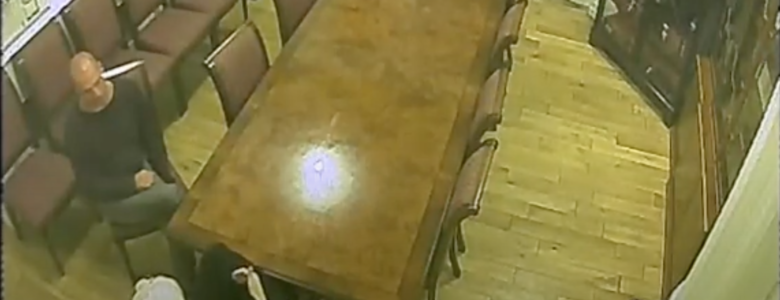
Yanis Varoufakis on his testimony in Spanish case against UC Global
Yanis Varoufakis testified in a Spanish court case against UC Global on 27 October.
UC Global is a security agency that illegally collected personal documents — including passports — and conversations from Julian Assange and his visitors during his time at the Ecuadorian Embassy.
These are his remarks after his testimony.
“I just came out of the court house here in Athens where I testified to the Spanish judicial authorities in a case against UC Global, a company that was hired by the American authorities to spy on us — that is on all those of us who visited Julian Assange in the Ecuadorian Embassy during his incarceration there.
I saw material that is shameful, I saw videos of myself, I saw photographs of my wife’s visa, I’ve seen transcriptions of my private conversations with Julian Assange. Of course, none of that is a great surprise, but none of us at the same time have the right to accept this as normal.
We have to fight against this normality of transparent citizens and opaque dictators, opaque governments, opaque Ministers of Defense.
MeRA25, our political party, DiEM25, our pan-European movement, and the Progressive International, is going to do whatever it takes to turn the tables on those who are killing Julian Assange, as we speak, in Britain’s Guantanamo Bay by incarcerating him 23 hours every day and night in strict isolation. We are going to turn the tables on them, and turn them into the accused.
The accused of crimes against humanity and of trying effectively to annihilate Julian Assange for the great crime of doing journalism, of telling us what our governments have been doing in our name behind our backs.”
Find out more about the case and see the material here.
Photo Source: Still from video material related to the case.

Towards International Agrarian Reform: What role would Europe play?
The EU should promote more sustainable, small-scale agriculture.
A powerful swarm of international financial institutions (IFIs), like the International Monetary Fund and the World Bank, wields great precedence in setting the direction of EU agricultural policies. The usual suspects seem to have once again determined the agenda during recent backroom negotiations on a new Common Agricultural Policy.
This provoked outcries and accusations of “Greenwashing” from environmental groups as established as Greenpeace, despite the EU’s effort to gloss over its agricultural plan as being in synch with the “Green Deal” (that misappropriated term which Ursula Von Der Leyen plagiarised from our allies, fellow proponents and hopeful initiators of the Green New Deal). Other critics include the remaining defenders of family farming in Europe. Voices of protest were undercut once again in this week’s EU parliamentary vote against reform-proposals, as ministers decided to favour agribusiness-as-usual with nearly €400 billion.
Notably for those interested in foreign policy, neither side in the negotiations mentioned the trade and environmental impact these policies have on countries in the Global South. This pattern is not new. The economic analyses of those designing EU common agricultural policies have almost never considered the long-term societal and ecological costs of the narrow industrial options they impose overseas on the world’s South. Yet these costs tally extremely high, and are perhaps incalculable. For example, the ways in which industrial mechanised farming affects the balance of biodiversity, including soil and water, while rendering the production of nutritious, quality food impossible over the long term. According to infectious disease experts, mechanised industrial farming –the pivot of EU dominance in the global agricultural market — vastly increases the likelihood of future (mostly bacteriological rather than viral) pandemics on our already pan-quarantined horizon.
But this is not even registered as a blip on the radar screen — none of these costs enter the IFI’s calculations. Neither do the brutal consequences of the marginalisation of small farmers by agribusinesses: a spiral of land-dispossession, poverty, malnutrition, debt, mass-migration and even suicide. This sordid reality is not exclusive to cultivators in the financially choked South — this also describes areas of Europe’s East in particular.
Eastern European farmers export their best produce Westwards, amidst a local market competitively swamped by increasingly bad but expensive Western products, in the shadow of extractive investors. The Balkans, including EU member Bulgaria, receive agrotoxins banned in the Western EU because of how they endanger children and fauna. For example, Bulgaria’s beekeepers report that our crucial pollinator figures among these casualties of venoms which are rampant in their country despite being outlawed — just imagine what Europe exports to Asia, the Americas and Africa.
In European bureaucracy, these costs are written off as “market externalities”, acceptable consequences of “market failure”. Said without jargon: this is how unregulated markets fail humanity and nature, by letting private interests hinder effective production and the fair use and distribution of public goods.
Take off the CAP.
Despite the fact that any child can understand how food and agriculture are essential life-sustaining activities, small farmers and agricultural labourers comprise 70% of the world’s poorest billion people. In developing countries, agriculture employs on average 60% (ranging from 20 to 90%) of the population. By contrast, agriculture employs less than 5% of EU citizens and generates just 1.6% of EU gross domestic product (GDP).
The EU should promote more sustainable, small-scale agriculture to generate higher yields over the long term, leading to more equitable growth. Instead, it spends almost half its budget on subsidies via the common agricultural policy (CAP).
The CAP enables producers to keep prices artificially low, often below production cost, making it impossible for small producers in poor countries to compete in world markets — and even for Europeans within their own markets. Often the main beneficiaries of subsidies are not Europe’s small farmers, but its largest landowners — the rural oligarchies. Subsidies spur overproduction in the EU and the global dumping of cheap EU food surpluses, economically locking out most of the world’s family farms.
This is also about migration. Every year, roughly 50 million people leave rural areas, seeking alternative livelihoods. As a result, valuable knowledge on locally optimal, traditional farming goes lost. Food security therefore becomes threatened, while rural migrants swell the planet’s urban slums and banlieues.
It’s time to blow off the CAP.
Neoliberalism: Protectionist, but only when convenient.
For decades, Europe and other wealthy regions, have insisted on “reciprocity” in trade relations with less industrialised countries, sounding the trumpet of “free trade” to compel these countries to open up (liberalise) their markets in tandem with structural adjustment regimes enforced by International Financial Institutions (IFIs).
So-called ”reciprocity” in trade agreements between countries with vastly asymmetrical economic development levels mostly benefits affluent countries with highly developed manufacturing and service sectors, while denying poorer countries the space and flexibility to develop their own industries.
On the other hand, “reciprocity” or bilateralism goes unobserved in areas like agriculture — where countries in the Global South actually have an advantage, and would profit greatly from export. In these areas, Europe maintains a highly protectionist trade policy, exemplified by CAP and a battery of tariff and trade barriers. A number of financial and trade institutions ranging from the WTO to bilateral and regional “Free Trade Agreements” and what in the jargon are called “conditionalities” and “structural adjustment” regimens, play a crucial role in these destructive patterns.
Revitalise the Countryside.
Europe must cease subsidies to agribusiness, factory farms and wealthy landowners. These funds should go towards rural rehabilitation — for small farmers and sustainable agriculture, nature conservation, agroforestry, and rewilding. Europe should promote agrarian reform across the board instead of generating unfair competition with farmers in what we call the Global South — those regions the Cold War’s architects had named “the Third World”.
Short-sightedness and Eurocentrism have bred a policy in which many pesticides that are banned from use in Europe — such as the Swiss-designed chemical Paraquat, which causes Parkinson’s disease through long-term exposure — continue to be legally produced in the EU for shipment to South America, spreading illness and birth defects. A more comprehensive, and transnational ban on marketing locally-outlawed agrotoxins could encourage the revitalisation of more local agricultural traditions for developing natural pesticides, such as eucalyptus-extract or breeding certain fauna that prey on nuisances.
Pandemics do not only begin in exotic and surreal markets of Wuhan or Kinshasa — the likelihood of a bacteriological mutation inside European meat factories, might spark future outbreaks of disease, unless we act soon. The dense, overcrowded and sorrowful mechanized meat-and-egg factories in Europe stand as monuments to overproduction, and to the policies of drowning out and blocking trade with small-scale farmers outside of Europe.
DiEM25’s pillar on foreign relations proposes a policy of international agrarian reform as a matter of social-economic justice.
Furthermore, seeing the “Green” benefits of small-scale harvestry, we cannot seriously contemplate a Green New Deal without a global solidarity and international agrarian reform. The Green New Deal for Europe (GNDE) ought to be for everybody, and not just for Europe and North America. Rather than painting cruel policies “green”, we can envision a just transition, preserving dignified work and inherited knowledge about health, nutrition and the natural world, and in which migrants leave rural areas only because of choice, no longer driven by desperation or necessity.
This article was collectively produced by the Peace and International Policy pillar. It has drawn upon and contains several extracts from the work of a former member of this DSC, Sona Prakash, parts of which were also published in Jacobin earlier this year, and other parts contributed to the Green New Deal for Europe report “Blueprint for Europe’s Just Transition” in 2019.”
Photo Source: Giuseppe Russo from Pexels.

Yanis Varoufakis testifies against private company hired to spy on Assange
The fight for justice for Julian Assange takes place in the Greek courts, where Yanis Varoufakis will testify against the private company that was hired to spy on Assange while he resided in the Ecuadorian Embassy.
On Tuesday 27 October at 13h local time, DiEM25 co-founder Yanis Varoufakis will testify to the Special Investigations Unit for International Judicial Assistance as a witness for the prosecution, through a teleconference hosted in Greek courts. He will support a Spanish case against the private company UC Global, which was spying on Julian Assange during his stay in the Embassy of Ecuador in London.
The company in question had a contract with US authorities and is being investigated for potential violations of rights of Yanis Varoufakis and other visitors of Julian Assange.
More specifically, the investigation is focusing on the illegal video and sound recording of private conversations between Varoufakis and Assange that were secretly obtained by the security agency. It also pertains to the illegal collection of copies of Varoufakis’ passport, as well as the contents of his mobile — all of which was transmitted from UC Global to its “customer” across the Atlantic, i.e. the US government.
It is of critical importance that this case against those who have hunted Julian Assange for years is conducted by a European Justice authority. All the while, Julian is slowly dying in inhumane isolation in the British equivalent of Guantanamo: the high security HM Prison Belmarsh. And for what crime? For informing citizens in the West of the crimes conducted by their governments, in their name.
The co-founder of DiEM25 and Secretary of MeRA25, Yanis Varoufakis, will give his testimony to the Spanish authorities voluntarily via teleconference, thus contributing to the years of struggle conducted by DiEM25, MeRA25 and the Progressive International to support, and eventually free, Assange. It is to this struggle that we call you all to join your voices and help us free Julian Assange.
See the material.
(2020.05.29) Notarial Protocol Num. 921 [In Spanish]
REF 015 Muller Varoufakis [In Spanish]

No place for xenophobia in housing action
Housing shortages, caused by neoliberal policies, are to blame — not migrants.
First and foremost, the DiEM25 local group in South Holland, in the strongest terms, condemns xenophobia in all matters of life, including in matters of local democracy and of those charged with representing the entire public in the City Council of The Hague. Our condemnation was triggered by the local branch of the ruling party, VVD, supporting a motion that would have directed the City Council to find solutions for the housing problem in the city — with a catch. The proposed motion squarely blamed ‘migrants with poor prospects’ for the shortage of housing. In actual fact, the VVD further clarified that population control, based on the economic needs of the city, should be considered as a matter of policy.
Inflaming racial tensions does not address the inadequate supply of housing in the City.
Xenophobia only serves to turn public attention away from the root cause of the housing shortage in the Netherlands. Neoliberal policies that emphasise deregulation and privatisation, coupled with significant cutback on large-scale housing projects, are the real causes of shortage in affordable housing. The social housing sector, already under tremendous strain, is being further distressed through additional taxes and pressure to sell onto private investors – who then transform the social home onto the free market sector.
While the supply of new build homes to the city is at around 2500 units per year, the majority of those are unaffordable. In fact, the average rent for a 100 square meter home in The Hague is €1677 / month, far beyond the reach of even the middle-class. While the middle class spend, on average, 34% of their income on housing, water and energy, the lower and poorer classes spend just above 42% of their already negligible income for shelter.
An analysis of city data indicates that while poorer neighbourhoods are at 98% occupancy, one in five homes in the richest parts of the city remain unoccupied. The city is rapidly transforming, and gentrifying, towards a terrain for the elite. This shift will impact all at the lower economic echelons of society.
Rather than blaming the housing issue on ‘migrants with poor prospects’, the City Council could address the housing shortage in The Hague by:
- Focusing their time, efforts and energy on housing — not economically and racially stigmatizing those that seek fair shelter;
- Examining the high rates of unoccupied homes across the City — a plethora of empty homes suggests an imbalance in the housing market at best — and parking of illicit gains at the worst;
- Considering a rent-cap in the free rent sector — a successful policy measure replicated across Europe and the World;
- Encouraging the expansion of economic activities in nearby localities; and
- Increasing the income eligibility ceiling for housing subsidies to keep pace with the rapid increase in rental costs.
We also call on the Prime Minister to urgently condemn signs of xenophobia within his own party — he does after all represent the entire nation, and not just those that seek to pounce on nationalist sentiments for a few more votes.
Photo: The Hague, Netherlands.
Photo Source: Photo by Jonathan Ybema on Unsplash.
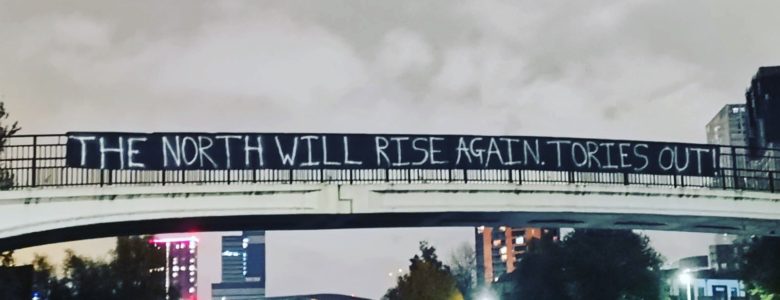
Covid diktats, disunity and revolt: The slow death of the United Kingdom
“Brutal, this is no way to run the country in a national crisis.”
This was Greater Manchester Mayor Andy Burnham’s reaction to finding out on live television through an email that his region was to receive only £22 million out of the £65 million he had asked of Westminster to support businesses affected by new lockdown measures. However, his quote would not be out of place in the pubs, restaurants and hotels around the country suffering unprecedented economic hardship thanks to new lockdown measures imposed by Westminster.
The situation is rapidly evolving, but as it stands it appears that Manchester will now be offered £60 million, considerably less than the £90 million they initially asked for. It is difficult to argue with Burnham’s claim that the North of England is “the sacrificial lamb for an ill-thought Downing street policy which doesn’t make sense in the real world.”
While some have accused Burnham of strongman posturing, it is bizarre to accuse a local leader of actually having the conviction to stand up for those he was elected to serve and demand financial support from Westminster. The neoliberal establishment and their client journalists in the commentariat have damned devolved governments in the UK, claiming that political dissent amounts to ungrateful wrecking and disloyalty to the union. Ultimately the division here is between English Conservatives and “everybody else”. This is a familiar picture, but one with increasing fault lines that are visible in Northern England, particularly the amorphous ‘red wall’ won by the Tories in December 2019.
In the case of Burnham’s standoff with Westminster, he was supposedly encouraged by Tory MPs in Greater Manchester to push for a better deal, a truth that was quickly walked back by MPs such as Chris Clarkson who have since lambasted Burnham. Fury about the derisory treatment of Manchester has not been restricted to Labour voters, with Manchester Young Conservatives tweeting:
“Boris has lied about helping us in the north. It’s time for him to go. He’s not a Conservative. He’s got no back-bone or genuine deals. He’s incompetent. He has now lost all the seats we worked so hard in Greater Manchester to win.”
The 2019 Tory election promises to “level up the north” have been proven to be snake oil, and those who flipped to the Conservatives last year will likely rue their mistake for years to come
Sadiq Khan is also staring down a government takeover of Transport for London unless he implements an increase in fares, cuts TFL pensions, increases council tax and a major extension of the congestion charge zone which will heavily impact those on lower incomes within the M25. It appears that any region of England with the gall to elect a Labour government is open to attack, and that the logic of nationalisation is on the table if it helps the Tories centralise power in Westminster, safely out of the reach of Labour thanks to their 80 seat majority. Meanwhile Wales, Scotland and Northern Ireland increasingly walk their own path, enacting their own lockdown policies in a much more decisive way than Westminster.
The union looks increasingly fragmentary, with a recent poll demonstrating 58% of Scots in favour of independence, and an internal market bill that seeks to place a border in the Irish sea, breaching the Good Friday Agreement.

Photo: Messages with ‘End London Rule’ or ‘Northern Republic Now!’ have been put up on highways.
The unilateral nature of the new coronavirus restrictions, essentially diktats from Westminster against predominantly urban Labour-led councils and regional authorities, has provoked outrage
There are a number of historical parallels that have been drawn, with particularly emotive appeals to the traumatic memory of Margaret Thatcher’s ‘managed decline’ of Liverpool in the 1980s, but also to her abolition of the Labour-controlled Greater London Council in 1986. However, such appeals to a more distant past are unnecessary and run the risk of creating a kind of generational dissonance. Instead, we should recognise that Tory austerity in the last decade has had a ruinous impact, disproportionately affecting the North, destroying its capacity to weather the costs of the pandemic.
The derisory sums of money offered to regions like Manchester, Liverpool and South Yorkshire will absolutely not be enough to cover the losses of thousands of businesses during this time of immense socio-economic crisis. Westminster’s pathological obsession with outsourcing public responsibilities to the private sector for astronomical fees is nothing new, but has provoked fury in recent weeks. Serco’s failing test and trace program recently plumbed new depths, only reaching just over 60% of close contacts of people with positive test results, yet days later saw its profits soar by an additional 20% above forecast. A stark contrast was also visible between the £7.80 per person made available to Mancunians and the £7,000 per day paid to some BCG consultants for their work on the test and trace program. Let’s also not forget that much of that £7.80 per person paid to Manchester will actually go to local councils to fund their own test and trace systems, an example of socialism for the private sector and austerity for the public sector. All in all, investment in council-ran test and trace was a comparatively paltry £300 million, despite the fact they are able to reach 97% of close contacts following positive tests.
Those looking to Labour for an alternative to Tory chaos have been bitterly disappointed
Sir Keir Starmer attempted to push a doomed vote through commons on a “fair one-nation deal” rather than seriously backing resisting regions. This is an extension of what is becoming an unwelcome characteristic of his leadership: silence or abstention on key issues and the overarching desire to appear like the sensible grown-up in the room, even at the expense of the most vulnerable in society.
The very idea of a “one-nation” deal seems to owe a rhetorical debt to “one-nation conservatism” which implies there is some kind of equality within the harsh measures or that they should be applied evenly across the country, which is clearly not the case. Such logic seems to exist in David Cameron’s illusory ‘big society’, rather than the reality of Britain in 2020, in which 14 million live in poverty and food bank use has increased 3,772% in the last decade. By whipping the PLP to abstain on basic human rights issues, including the right not to be murdered by undercover police, Starmer has effectively relinquished moral authority to the grassroots of the Labour party.
The real story here is that of a disaster of governance — and one that is not unique to the UK
Urban centres around Europe are struggling to deal with rising infections through contact reduction and imposing curfews and closures on bars and restaurants. In Brussels, Paris and Madrid curfews of varying levels are being rolled out, with little to no overarching long-term strategy.
Scientific advisors and leading economists in the UK this week published a letter calling for a “short but deep circuit-breaker” lockdown as the only way to bring infection rates down to a level safe enough to allow both the economy and social life to open up again. The Welsh devolved government are already following this path, and with infection rates spiralling out of control in the UK and no with discernible impact on infection rates by the most severe ‘Tier 3’ lockdown areas of England, it is difficult to envision any alternative solution that won’t lead to English hospitals being overwhelmed.
What the unilateral showdown between Westminster and the regions demonstrates is that the meagre, miserly economic policies that the Conservative government has been peddling for the last decade are not fit for purpose, and that the Tories govern in the interest of capital and little else.
If governments are designed to serve the people who vote for them, then the British government is an abject failure
Successive neoliberal governments on both sides have failed to redirect wealth towards local communities, as wages have stagnated and life expectancies have declined. The greatest lie told during the pandemic by those in power (facing some very stiff competition) was that “we are all in this together”, a phrase used by Rishi Sunak even this week as he announced support for Tier 2 regions, but not those in Tier 3.
The fact that £12 billion has already been spent on systems that run on Microsoft Excel 2003 which utterly failed to prevent the second wave, or even push infection figures down to manageable levels, is a failure of the Conservative government — not just Johnson, who will likely be scapegoated in the new year and seems eager to relinquish the stress of his position.
Moreover, the fact is that social and economic deprivation appears to be one of the leading causes of higher infection rates and COVID-related deaths, and the Conservative government have spent the last decade ferociously slashing away our welfare state ensuring that areas already disproportionately experiencing deprivation will continue to suffer remorseless austerity in this new form.
New models of community-based democracy which give representation and power to ordinary people are urgently required that will give working people the dignity and security they deserve and tackle the ongoing health and climate crises.
What we have now is Tory government by decree which gambles with the lives of ordinary people whom they detest, a government who refuse to extend school meals to children lest their “dependency” on food become too expensive. There are so many opportunities to build the power of ordinary people, but due to the Tory stranglehold on the House of Commons we shouldn’t look to electoral politics to achieve our aims. Instead, we must look much closer to our homes and workplaces.
The divisive politics of ‘leave’ and ‘remain’ must be abandoned, the only way to move forward will be a radical recovery plan out of the ashes of 2020
Movements like DiEM25 offer a model of truly democratic participation in society, which for the time being means constructive civil disobedience, and disobeying the diktats of a clueless and morally bankrupt establishment.
The challenges we face to create a more equal society after the pandemic has passed over us will be immense, but we have the solutions in front of us, and if Westminster won’t enact them then we must take up that mantle ourselves. We must be willing to push our local governments to adopt progressive policies that will put people and the planet first. We must not turn our back on the trade unions that built that labour movement, and who fight for workers’ rights. We must demand universal basic services and a universal basic dividend to create a pathway out of disaster capitalism future-proofed against economic downturn.
If the Labour party’s new leadership shy away from radical class politics we must demand they change course. Overall, we must ensure that any recovery from the ruins of austerity and the pandemic will be green, socialist and will create wealth for local communities instead of the Tories and their billionaire allies.
Photo Sources: 0161 Festival on Twitter, Photo 1, Photo 2.
The views and opinions expressed here are those of the author and do not necessarily reflect DiEM25’s official policies or positions.
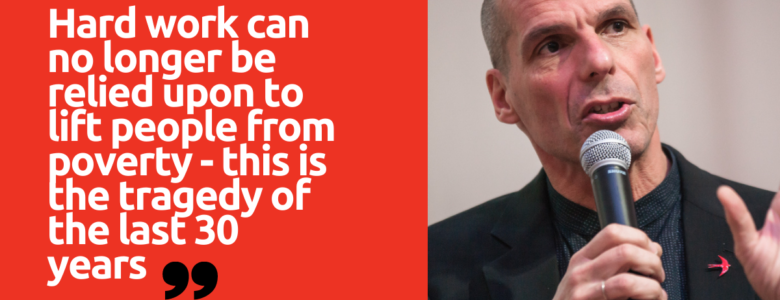
Yanis Varoufakis on Bloomberg: What to do about economic inequality
“That’s Debatable”: Is it time to redistribute wealth?
Intelligence Squared host John Donvan moderates a discussion between former U.S. Secretary of Labour Robert Reich, former U.S. Treasury Secretary Lawrence H. Summers, former Greek Finance Minister Yanis Varoufakis and Manhattan Institute Senior Fellow Allison Schrager. They are on “That’s Debatable.”
Robert Reich describes the outcome of his research in rust belt states such as Minnesota, Wisconsin, Missouri, in which he conducted free floating focus groups. In response to his question ‘Who do you support in the upcoming presidential race?’ he was surprised to hear that most people spoke of their liking of Donald Trump and Bernie Sanders ‘in the same sentence’.
“What I discovered after listening to their stories — these middle class, working class people in the rust belt — what I heard from them is: ‘We want somebody that’s going to shake things up, we want somebody that’s anti-establishment, we want somebody that’s going to be on our side’.In other words, what we have created in this country, because of the enormous power of great wealth, concentrated in the hands of a few, because of the power of great corporations, concentrated power, in terms of their political ability to get what they need — people in this country believe the game is rigged and they are willing, again and again, to support somebody who they believe is going to topple the power structure. That is a recipe for instability.”
When asking about the ‘trade offs’ of wealth redistribution, the moderator posited that it may engender the most costs while granting the fewest benefits. To this, Yanis Varoufakis replied that the asymmetries within the current capitalist system are too wide to remain unaddressed. Indeed, they leave the disenfranchised with no ‘weapons’ to defend themselves in the ‘gladiator arenas’ that they must struggle through to survive. He states that:
“If life under capitalism resembled the 100 meter sprint in the olympic games, of course it would be absurd to ask the fastest athletes to slow down or stop them of going fast in support or solidarity with those lagging — that would be absolutely ridiculous and nobody would want to watch this race. But life is no olympic games. It resembles more these days the Roman arena in which very well armed gladiators are facing victims that are weaponless, victims who are defeated not because they are not try hard enough or because they were not clever enough but because they are unarmed because of the asymmetry in the initial distribution of armor (of wealth)! For a while now, I think we know that, don’t we? You see, hard work can no longer be relied upon to lift people from poverty — this is the tragedy of the last 30 years.”
He then conveys ‘his kind of socialism’ in which the true spirit of competition can actually be invited to thrive.
“Let me convey (…) my kind of socialism. The kind of ideal that fires me up. It would be a sporting parallel but not with the olympics, but the national football league — your NFL. Where in the interest of competition, not fairness, teams face a harsh salary cap and the best players (the best young players) are forced to sign up for the weakest of teams. By preventing the successful team from monopolising the best players, the NFL’s constraints liberate the true spirit of socialism. This is the point about socialism — which is NFL — living together with markets in sync with harsh competition — which is what the NFL is — is I think a good model for the future.”
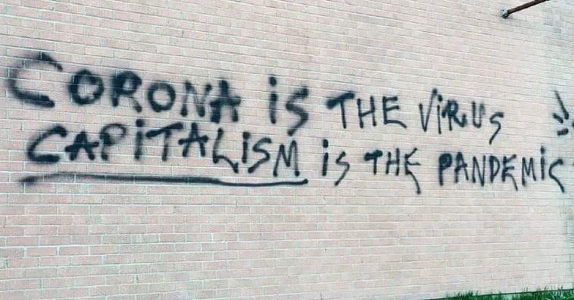
Everything must change, so that nothing remains the same
The book — Everything Must Change! The World After Covid-19 — based on our DiEM25 TV conversations is finally out. Read Srećko Horvat’s foreword here.
“Since armies can reach each other regardless of the thousands of miles which lie between them, friends have to show that they are just as independent from spatial distances as enemies. So let’s continue shooting our long distance missiles of friendship to each other in order to show those who are inventive only in order to destroy, that we are just as able to nullify space as they.”
― Günther Anders to Claude Eatherly, 1959
In the famous novel of the mid-twentieth century The Leopard, Giuseppe Tomasi di Lampedusa chronicles the struggle of the Sicilian aristocracy to survive in the face of civil war and revolution, the so-called Risorgimento. One of the most famous sentences — later proclaimed by Alain Delon in Luchino Visceonti’s movie adaptation of the book — reads, “Everything must change, so that everything remains the same.” In a similar way, forced by the Covid-19 crisis, our contemporary ruling class is well aware that a deep transformation is taking place and that the only way for things to remain the same is the emergence of a new social and political arrangement that can keep them in power.
What other proof is needed of the deep tensions plaguing capitalism but the spiking of Jeff Bezos’s fortune by $13 billion in a single day in July 2020, as the Covid-19 crisis prioritizes the free movement of goods even higher than the free movement of people, while, at the same time, Amazon workers have been dying of Covid-19 and protesting their inhuman working conditions? What other proof than Elon Musk, the embodiment of the capitalist expansionist dream, who, when challenged with the claim that the United States coup against Evo Morales occurred to enable him to obtain Bolivia’s lithium, simply answered, “We will coup whoever we want! Deal with it.” And this is not the first time that the ruling class has openly proclaimed that there is a class war going on. Remember Warren Buffet, another billionaire, who famously said, “There’s class warfare, all right, but it’s my class, the rich class, that’s making war, and we’re winning.”
With the COVID-19 crisis, which is exacerbating existing inequalities and enhancing the accumulation of profit for exactly those driving the planet toward mass extinction, it has never been so tangible that a brutal class war is happening. And they are, again, trying to win.
“Everything must change, so that everything remains the same” proclaims the ruling class once again, clinging to the hope that they will manage to stay in power and continue the vicious cycle of exploitation, extraction, and expansion — the three Es of the world system called capitalism. Instead of investing in the hospitals and schools that were already victims of decades of austerity and underfunding, they are, once again, bailing out the companies responsible for the climate crisis and global injustice. Instead of protecting workers’ rights and using technology to abolish exploitation, the suffering of so-called “essential” (or “frontline”) workers has only increased with the COVID-19 crisis, while the situation is being exploited for the expansion and acceleration of “surveillance capitalism.”
Instead of protecting the climate, further extraction of natural resources and destruction of habitats is leading to an age of pandemics, with even deadlier viruses than COVID-19 waiting just around the corner. Instead of defunding the police, almost everywhere police have responded to COVID-19 as to a war, transforming themselves into an army. As a recent commercial for the National Guard in the United States claimed, “Sometimes the front lines are right in our backyard.”
It seems the famous call of the Weather Underground to “Bring the war home!” has suddenly been realized, only its cause is not a social movement or a clandestine revolutionary party, but a virus. From Minneapolis to Portland, Budapest to Istanbul, and Santiago to Belgrade, the capitalist war has now, indeed, become a civil war. “I can’t breathe” — repeated again and again by Eric Garner, George Floyd, and many other victims of structural racism — has become the predominant feeling of those suffering and dying from the suffocations of police brutality, air pollution, viruses, depression, anxiety, fear, and the myriad other symptoms of the expansion of capital into nature, animals, lungs, minds, and souls.
While the viruses of capitalism and racism ravage the world, this book itself is the product of a different kind of virus.
Not only would this publication not have come to light without the COVID-19 coronavirus, but it is a product of the “viruses” of cooperation and internationalism that are aimed precisely at the virus of a world system that is driving us toward extinction. The plethora of critical voices that have emerged from “self-isolation” is a proof — bye-bye Maggie Thatcher! — that there is such thing as society, even if we are often forced to behave and die as individuals. The project to document some of these voices, first in video conversations and then in this book, started in a room in Vienna in which I was confined to isolation in mid-March 2020, just as Europe became the epicenter of the COVID-19 pandemic and before it would severely hit the United States, Brazil, Mexico, and elsewhere. In those early days, states across Europe declared a “state of exception” with unprecedented restrictions on movement, and I was unable to return to my country, Croatia, for another two months.
The only way to prevent myself from going crazy and falling into utter hopelessness consisted in hacking my way out of “self-isolation” by creating what we called “DiEM25 TV: The World After Coronavirus.” For those of us in the Democracy in Europe Movement 2025, who are used to tirelessly traveling around the world, meeting people, and organizing on the ground, isolation was a new situation, as it was for every true internationalist. Suddenly, all that was left was the digital. And even this would soon be turned into what Naomi Klein called the “Screen New Deal”: the penetration of surveillance capitalism into our brains and souls, the further exploitation of cognitive workers, and the extraction of our affects and even our unconscious.
Yet, for a short time between mid-March and July 2020, which already seems like centuries ago, we succeeded in exploiting a crack in the “Screen New Deal” and launched an online “television” channel from our living rooms and places of self-isolation. Much more than just television, this was the creation of a common space, free to everyone, constructed by hundreds of activists and intellectuals from around the world. Rarely have so many people been connected through a single event like the COVID-19 pandemic, with billions around the world placed in some form of quarantine. Rarely have the people on this planet engaged in so much communication, and this despite widespread “social distancing” — for, while there was physical distancing, the social resurged as never before.
We have seen the worst of times and the best of times: on the one hand, a completely new situation of an unprecedented health crisis and, on the other, the necessity to connect and construct a world beyond the destructive notion of “progress” that dominates capitalist modernity. If the slogan of the World Social Forum was “Another world is possible,” ours is that graffitied in Minneapolis after the brutal murder of George Floyd: “Another end of the world is possible.” Over the course of 2020, it has become clear (even to those previously in denial) that the end of the world as we know it is everywhere. People are suffocating not just at the hands of a virus but of police brutality and a world system based on extraction, expansion, and exploitation. The climate crisis, the nuclear threat, pandemics, and racism: these are the four horsemen of global capitalism and its structural violence against nature, humans, and the future itself. If we want this to change, nothing can remain the same.
This book is intended as a collective message that transnational cooperation and resistance, precisely in times of global lockdowns and police states, not only remains possible, but becomes necessary.
The list of people to thank, including both those whose conversations have been published and those whose haven’t (simply because of a tight schedule and publishing constraints), is long and incomplete. If there is one person without whom DiEM25 TV would certainly have been impossible, it is Davide Castro: a brilliant comrade from Portugal who made our program live and alive in the first months of quarantine. Next are the human machines Yanis Varoufakis and Renata Ávila who, with their immense energy and critical thinking, led and organized many of the conversations; Judith Meyer, who was a true driving force in the shadows; and our brothers and sisters in arms from DiEM25: Ivana Nenadović, Erik Edman, Luis Martín, Mehran Khalili, Sissy Velissariou, Johannes Fehr, Simona Ferlini, Pawel Wargan, David Adler, Claudia Trapp, Jordi Ayala Roqueta, Pawel Wargan. A big thanks also to numerous DiEM25 volunteers: Andrea Chavez, Max Gede, Dilek Guncag, Esmé Flinders, Ioannis Theocharis, Jerome Bertrand, Julie Hamilton, Micah Jayne, Michael Giardino, Pim Schulte, Rodrigo Fiallega, Niels Wennekes, Matias Mulet, and many others.
Last but not least, in a world in which education and journalism, publishing and critical thinking, become not only a privilege but subversive acts in themselves, it is the courageous publishers — and readers! — who are in a race against time itself, not only preserving an archive for a future in which mass extinction is quickly becoming our only horizon, but disseminating the tools for a common struggle toward a world beyond the ceaseless expansion of capitalism and fascism. Thanks to the daring publisher Colin Robinson and our diligent editor Catherine Cumming, these conversations have truly become a sort of collective diary of the early weeks and months of Covid-19, a common endeavor that might one day serve to document that, even in dark times, to paraphrase Bertolt Brecht, there was singing. And the songs were not just about the dark times, but about friendship and love, solidarity and egalitarianism, mutual aid and resistance to the old world that is dying and kidnapping our future.
Everything must change, so that nothing remains the same.
Nothing of the old system must stay, and everything of the beauty, humbleness, and determination of our common struggle — as heterogeneous and ambiguous it often appears — must be cherished as one thing that the old system will never be able to understand. It must be grasped as one of the key ingredients that will bring this system down. Other ingredients include, as we hope this book shows, lots of organization and introspection occurring at the same time; less work, more love; less monologue, more dialogue; less ego, more compassion — and, again, lots of organization! If they have missiles that can destroy entire countries thousands of miles away, let us, to paraphrase the great Günther Anders, never stop shooting our long-distance missiles of friendship to each other, in order to show those who are inventive only in order to destroy that we are not out to nullify space as they are — we are, unlike them, able to create new spaces and reinvent a future worth living for.
Everything Must Change! THE WORLD AFTER COVID-19
Edited by Renata Ávila and Srećko Horvat
Contributors: Tariq Ali, David Adler, Gael García Bernal, Larry Charles, Noam Chomsky, Brian Eno, Daniel Ellsberg, Kenneth Goldsmith, David Graeber, Johann Hari, Maja Kantar, Stephanie Kelton, Stefania Maurizi, Evgeny Morozov, Maja Pelević, Vijay Prashad , Angela Richter, Saskia Sassen, Saša Savanović, Jeremy Scahill, Richard Sennett, John Shipton, Astra Taylor, Ece Temelkuran, Yanis Varoufakis, Roger Waters, Slavoj Žižek, and Shoshana Zuboff.
Foreword by Srećko Horvat. Read more about the book and purchase it here!
Photo: A graffiti in Chicago, Illinois, the United States of America.
Photo Source: The Contrarian blog.
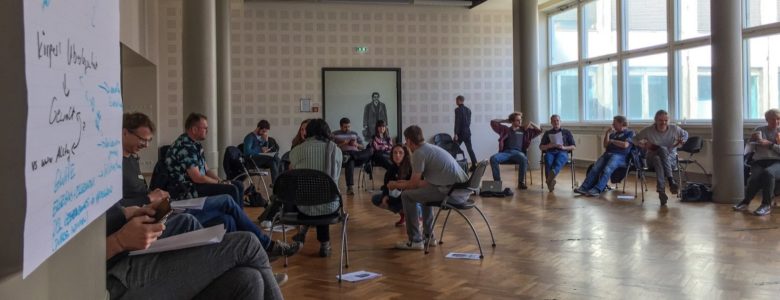
The DiEM25 Summer Festival 2020: Political organisation in Germany during the pandemic
On 19 September, DiEMers met for The DiEM25 Summer Festival 2020 — the yearly German-speaking reunion of the movement in Berlin.
This meeting took place in the DiEM25 grassroots tradition of an easy-going gathering with crowd-sourced inputs and discussions organised and curated between the local group of DiEM25 with the movement’s national collective. This concept necessarily received a 2020 update in the shape of a Corona hygiene concept which ensured that no one was infected or passed on COVID-19 at the event. Thanks to all participants for that.
Guests came from Berlin but also cities all over Germany and included active members, members of friendly organisations, and new members which show that the interest in transnational solutions remains strong. It was also great to see former DiEM25 members that also came back to appreciate the personal connections and share their perspective and current projects.
A timetable led us from participatory exchanges on gender stereotypes, discussion of citizen’s assemblies in connection with the Green New Deal for Europe to inputs on big tech capitalism or municipalism. It also allowed for discourse on the state of our movement, the lessons of the past year and the potential of DiEM25.
It was especially heartwarming to see that despite COVID-19, the motivation to make a change and try new paths remains strong.
In line with the great DiEM25 spirit that makes strangers connect with ease over shared values, the weekend took off on Friday with a panel discussion and the livestream of the Progressive International at a Berlin bar. This is despite the COVID-19 measures that were imposed in the last seven months, which reduced street level activity and the retreat of many local groups into online coordination.
The next day a communal breakfast opened the stage for what would be a very long day, as the optimism of DiEM25 organisers to be able to stick to a time table and the energy and enthusiasm with which topics were discussed ensured that instead of ending at 19:00 for a communal dinner, discussions continued throughout the dinner and ended in a closing of the event at 21:30.

Clearly, that could only have been the ending of the formal event, as most of the happy, spontaneous DiEM25 family continued their path through the city of Berlin. As happens so often, the shortness of the night before and the length of the program on the day itself only leads participants to spend more time with each other and debate the big questions of our time.
Some even took part in next day’s demonstration against the negligence of Moria and other refugee camps and the inaction of the German government. Others were already on the way back to their cities, planning demonstrations, or continuing their political activities — as always, very tired but with a fresh boost of motivation that a change can come and we can play our part in it.
The organisers thank everybody for adhering to the hygiene concept, they thank all the people that made this event possible and are grateful for all people that contributed to the fundraiser for this event.
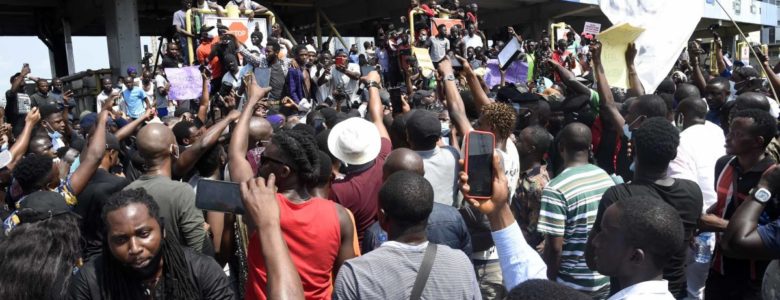
DiEM25 condemns violent crackdown on widespread protests in Nigeria
The violent crackdown on protesters in Nigeria has prompted our movement’s concern over the widespread of authoritarianism across the globe.
DiEM25 founder and MeRA25 member of the Greek Parliament, Yanis Varoufakis, stated:
“It is with horror that I heard on the radio this morning eye witness accounts of how, utterly unprovoked, police opened fire against a crowd of peaceful protesters in Lagos – leaving more than twenty lifeless bodies behind. Progressives across the world must send a loud message to governments that we shall not tolerate such brutality. Anywhere around the world.”
DiEM25 Coordinating Collective member, Renata Ávila said, “The Nigerian government, who agreed to extensive police reforms, needs to translate their words into actions, or face consequences. A nation with leadership in trade and diplomatic ambitions in the region and the world, should be accountable and responsible for the crimes against humanity committed against peaceful protestors. Cancelling all EU visas from the Nigerian Federal Government and freezing aid and trade deals can send a powerful message to those in charge.”
As noted in the New York Times, “…protesters in Nigeria, the most populous country in Africa, have been demanding that the government disband a rogue police unit called the Special Anti-Robbery Squad, commonly known as SARS, and that they say particularly robs, tortures and even kills well-dressed young people who the officers think might have money. The crowds have also called for punishment of officers who commit brutality.”
DiEM25 stands with the protesters in Nigeria who have suffered from such acts of violence, as we will always do wherever and whenever such brutal acts occur.
Photo (c) CNN